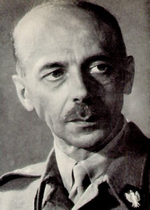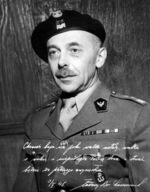Tadeusz Komorowski
| Surname | Komorowski |
| Given Name | Tadeusz |
| Born | 1 Jun 1895 |
| Died | 24 Aug 1966 |
| Country | Poland |
| Category | Military-Ground |
| Gender | Male |
ww2dbaseEditor's Note: This biography is written by guest contributor Richard Komorowski.
ww2dbaseGeneral Count Tadeusz Komorowski (June 1, 1895 - August 24, 1966), better known by the name Bór-Komorowski, was the principal Polish military leader in Poland during the war.
ww2dbaseKomorowski was born in Lwów, Austria-Hungary (now Ukraine). In the First World War he served as an officer in the Austro-Hungarian Army, and after the war became an officer in the Polish Army, rising to command the Grudziadz Cavalry School.
ww2dbaseAfter initially campaigning against the Germans in September 1939, he functioned in the Polish Underground Army in the Krakow region, with the code-name Bór. In July 1941 onwards, he was appointed as deputy commander of the Home Army (Armia Krajowa or AK) by the Polish Government-in-Exile, and in March 1943, now with the rank of Brigadier-General, became commander.
ww2dbaseIn mid-1944, as Soviet forces advanced into central Poland, the Polish government-in-exile in London instructed Bór-Komorowski to prepare for an armed uprising in Warsaw.
ww2dbaseThe reasons for the Warsaw Uprising in 1944 (not to be confused with the Warsaw Ghetto Uprising the previous year) were twofold. The Wehrmacht was in relative disarray, still retreating before the Russian summer offensive of that year, and therefore relatively vulnerable. It was hoped that the uprising would enable the Red Army to advance further west towards Germany.
ww2dbaseThe primary reason, however, was political. After the Russian invasion of Eastern Poland, 17 September 1939, hundreds of thousands of Poles, military and civilian, were arrested by the Russians and sent to concentration camps. In 1940, approximately 15,000 Polish reserve officers were executed at Katyn and other sites. Russian atrocities towards the Poles easily equaled those of the Nazis. It was therefore vitally important that the capital of Poland be liberated by Poles loyal to Poland and the Government in Exile, rather than the Communists.
ww2dbaseThe uprising began on August 1, with the Red Army some 20 kilometres away. Despite their previous urgings for the Poles to revolt broadcast on the Russian controlled radio Kosciuszko. When fighting began, the Soviet advance ceased and they actively impeded RAF parachute drops of supplies by not allowing planes to refuel at Soviet bases.
ww2dbaseThe uprising was brutally suppressed by the Nazis, but for two months the Polish forces tied up large numbers of Wehrmacht and SS troops, plus auxiliary forces composed of criminals and Red Army deserters.
ww2dbaseAfter two months surrender was inevitable. Their major victory was recognition of the AK as a legitimate army by the Germans, so members of the AK were treated as prisoners-of-war, with the protection of the Geneva Convention. Komorowski himself was held at Colditz until just before it was liberated by the Americans. The SS, who planned to use him as a hostage, removed him from the castle but some days later released him unharmed. Despite pressure from Germans, he refused to issue orders of surrender to Home Army units in German controlled Poland, who continued fighting. After the war he lived in London, and was Prime Minister of the Polish Government-in-exile from 1947 to 1949. He wrote the story of his experiences in The Secret Army (1951). He died in London in August 1966, age 71.
ww2dbaseSources: Polonia Today, Spartacus Educational, Wikipedia.
Last Major Revision: Mar 2008
Photographs
 |  |
Tadeusz Komorowski Timeline
| 1 Jun 1895 | Tadeusz Komorowski was born. |
| 24 Aug 1966 | Tadeusz Komorowski passed away. |
Did you enjoy this article or find this article helpful? If so, please consider supporting us on Patreon. Even $1 per month will go a long way! Thank you. Share this article with your friends: Stay updated with WW2DB: |
Visitor Submitted Comments
All visitor submitted comments are opinions of those making the submissions and do not reflect views of WW2DB.
» Invasion of Poland
- » 1,150 biographies
- » 337 events
- » 43,914 timeline entries
- » 1,241 ships
- » 350 aircraft models
- » 207 vehicle models
- » 372 weapon models
- » 123 historical documents
- » 260 facilities
- » 470 book reviews
- » 28,533 photos
- » 432 maps
Fleet Admiral Chester W. Nimitz, 16 Mar 1945
Please consider supporting us on Patreon. Even $1 a month will go a long way. Thank you!
Or, please support us by purchasing some WW2DB merchandise at TeeSpring, Thank you!
7 Sep 2016 03:39:07 PM
sad fates of Polish soldiers after the war